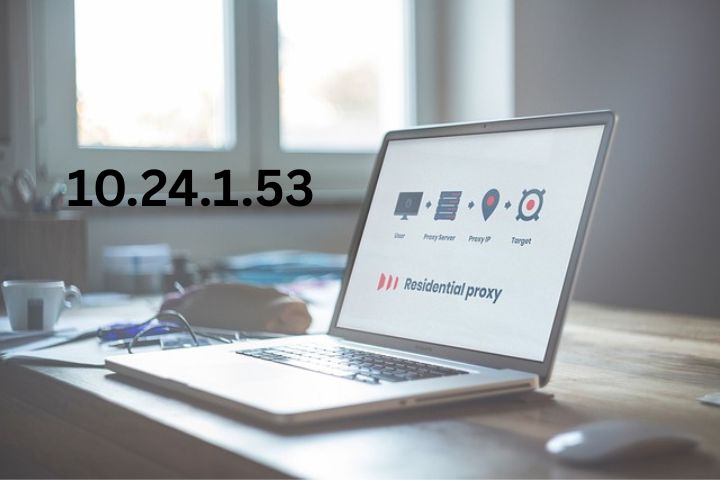In today’s world of connectivity every device in the network requires an unique identifier in order for communication. This is known as the Internet Protocol (IP) address. Of the billions of possible IP addresses, a few are reserved for private use in local networks. One example is 10.24.1.53. The secure IPv4 address plays an important part in internal networking, which makes it crucial for IT professionals or developers as well as homeowners to be aware of its function, usage as well as security consequences.
What Is an IP Address?
An IP address acts as a digital postal code sending data packets between devices via the internet or an internal network. It’s part of Internet Protocol, which governs the manner in which devices exchange data.
There are two main kinds that IP addresses can be found:
- IPv4 is a 32-bit system that contains approximately 4.3 billion addresses unique.
- IPv6: A more modern 128-bit network designed to support the ever-growing number of devices around the world.
10.24.1.53 10.24.1.53 can be described as an IPv4 address that is written in the format of dotted decimal (four figures separated by a period).
Public vs. Private IP Addresses
IP addresses fall under two categories:
Public IP Addresses
An IP address with a public IP address is unique to the world and allows servers or devices to be directly accessed from any location on the internet. These IP addresses are assigned through Internet Service Providers (ISPs) and are necessary to host web pages, apps on the internet and other internet-connected services.
Private IP Addresses
Private IP addresses are only available to be used only in local network. They aren’t accessible directly via the internet, thereby providing an extra layer of protection between the internal device and outside sources.
The Internet Assigned Numbers Authority (IANA) reserves the following private IPv4 ranges:
- 10.0.0.0 – 10.255.255.255
- 172.16.0.0 – 172.31.255.255
- 192.168.0.0 – 192.168.255.255
The IP address 10.24.1.53 is in the 10.x.x.x range, which indicates that it’s a private IP address.
Why 10.24.1.53 Is Private
Private IP addresses aren’t visible or routable over the internet for public use. They are instead used to connect devices in private networks like home or office setups. The internet connection for these devices is accomplished through Network Address Translation (NAT) which permits several devices to connect one public IP.
Common Uses of 10.24.1.53
- Enterprise Networks
Large companies often utilize the 10.x.x.x range since it has many internal addresses, which makes it a perfect choice for thousands of connected devices. - Home Networks
While most home routers are set to default 192.168.x.x addresses advanced users can configure routers with addresses such as 10.24.1.53 for greater control.
- IoT Devices
Cameras, smart devices like thermostats as well as thermostats and sensors frequently utilize private IP addresses to remain connected and secure to the local network. - Router Administration
Network appliances and routers often assign private IPs such as 10.24.1.53 for administrators to gain access to management dashboards. - Development and Testing
Developers typically set up test environments with private IP addresses to build safe, isolated testing configurations.
Benefits of Using Private IP Addresses
- Protection: devices are shielded from direct access by external sources and reduce the risk.
- The ability to scale: Private ranges can support many devices.
- Cost Efficiency: One public IP could be used to service multiple internal devices through network NAT.
- Flexibility: Network administrators can reuse private IPs in isolated environments.
Security Considerations
Private IPs such as 10.24.1.53 are not necessarily secure, and therefore network security must be protected by layers of
- Make sure you use strong passwords for routers and other devices.
- Install firewalls to block traffic.
- Segment networks that use VLANs for greater access control.
- Regularly update device firmware.
- Monitor logs to detect suspicious behavior.
Troubleshooting 10.24.1.53 Issues
If you are having issues with the devices assigned this IP Try these steps:
- Verify the network settings (IP subnet mask and gateway).
- Ping on the device, to check connectivity.
- Restart switches, routers or access points.
- Examine firewall and NAT settings to see if there are any misconfigurations.
- Verify that there are there aren’t any duplicate IP addresses within the same network.
Can 10.24.1.53 Be Accessed From the Internet?
There is no way to connect devices that have 10.24.1.53 and any other private IP are not able to be directly connected online. To allow remote access administrators, they can set up port forwarding, make use of the VPN or install security-grade remote access devices.
Conclusion
This IP 10.24.1.53 address 10.24.1.53 is an IPv4 private address that was specifically designed for use on local networks. It assists devices in communicating internally, without using up many publicly available IP addresses. While it can’t be accessed directly via Internet, it offers flexibility, scalability and a better management of resources for businesses and homes.
Frequently Asked Questions (FAQ)
1. What is 10.24.1.53 employed to do?
It is an individual IPv4 address that is assigned to devices in the local network for internal communications.
2. Do I have access to 10.24.1.53 from a distance?
It’s not directly. You’ll require port forwarding as well as the use of a VPN or remote access software to connect to externally.
3. Why is my router able to assign 10.24.1.53?
Routers usually utilize the private IP ranges to arrange and control devices in the network.
4 Does using 10.24.1.53 improve security?
Security isn’t guaranteed on its own However, privacy can limit the possibility of exposure. Make sure you are using security techniques that are strong for total security.
Also read : Henof.com tech

